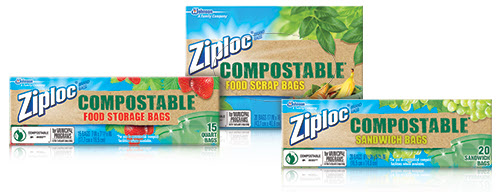When compostable plastics first hit the scene around the middle of the last decade, most of us loved the idea – what a great solution for all of that plastic sitting in landfills, right? Of course, it wasn’t that simple: corn-based plastics meant diverting more food away from human consumption, and “compostable” didn’t mean “toss it in your backyard composting bin.” These materials require commercial composting, and that’s not a service that’s available everywhere. As such, most compostable plastics probably aren’t being composted… but that’s changing as more cities add pick-up services for yard waste and food scraps, and more entrepreneurs recognize the demand for large-scale composting.
Fortunately, an established company like SC Johnson can afford to gamble with a niche product like a compostable food storage bag, and has done so under its Ziploc brand. Released earlier this year, Ziploc compostable bags are certified under ASTM D6400 by the Biodegradable Products Institute for commercial composting. The company sent me a couple of free boxes to try out, and, after a few weeks, I can report that, despite the different material, these bags work great: I’ve used them for typical refrigerated storage and for carrying food away from home, and, in every case, everything stayed fresh, dry, and clean.
I can’t, however, compost them – we don’t have any facilities nearby. As such, it would be silly for me to buy these: they’re much more expensive than regular Ziploc bags, and I’m not doing anything for the environment by buying them. If you do have commercial composting available, though, you can close the loop on your food storage. Yes, you’ll pay more for that option right now… but you can also show SC Johnson (and, by extension, other companies) that there’s demand for such a product.
Because they’re taking a chance with this product, they aren’t yet available on grocery store shelves; if you want compostable Ziploc bags, you have to purchase them from the company’s online Green Choices Marketplace. While you’re there, of course, you can check out some of there other greener offerings from brands like Pledge, Windex, and Shout.
Got curbside compostable pick-up available in your area? Have you made changes to your food storage practices? Let us know…


Avid Composter
Jeff — Did you actually try composting the ziploc bags in your backyard compost pile? Despite the fact that BPI products are only certified for commercial composting, I’ve had a lot of success with them breaking down in my backyard pile — in about 6 months there’s almost nothing left. Big brands like SC Johnson can’t take the risk of promoting this, but committed consumers can be pioneers!
Also, there are indeed some truly home compostable plastics on the market, certified to European standards, such as BioBag (available at Whole Foods and elsewhere). BioBags allow households like mine in areas without curbside composting to easily collect food scraps, and compost them in the backyard pile.
Jeff McIntire-Strasburg
I have not… I may toss a used one in there just to see how it does… thanks for the tip!
Avid Recycler
Most households have curbside recycling, or nearby recycling centers for plastic recycling. Instead of making storage bags compostable, how about just making them recyclable?